【最新】人教版八年级英语上册Unit9 SectionB 知识点
八年级上册人教版英语第九单元2b知识点
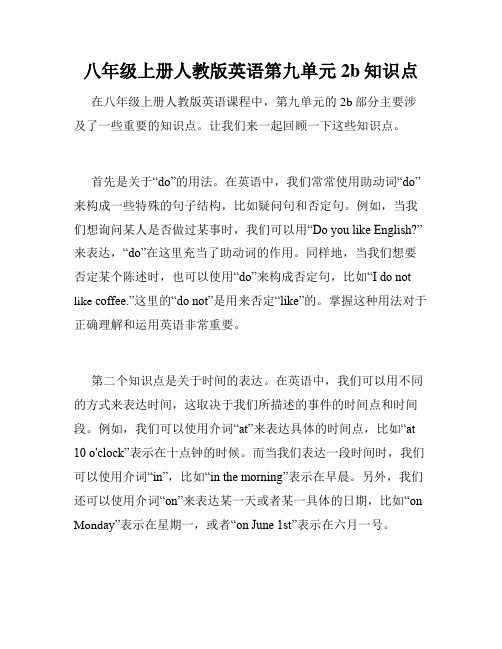
八年级上册人教版英语第九单元2b知识点在八年级上册人教版英语课程中,第九单元的2b部分主要涉及了一些重要的知识点。
让我们来一起回顾一下这些知识点。
首先是关于“do”的用法。
在英语中,我们常常使用助动词“do”来构成一些特殊的句子结构,比如疑问句和否定句。
例如,当我们想询问某人是否做过某事时,我们可以用“Do you like English?”来表达,“do”在这里充当了助动词的作用。
同样地,当我们想要否定某个陈述时,也可以使用“do”来构成否定句,比如“I do not like coffee.”这里的“do not”是用来否定“like”的。
掌握这种用法对于正确理解和运用英语非常重要。
第二个知识点是关于时间的表达。
在英语中,我们可以用不同的方式来表达时间,这取决于我们所描述的事件的时间点和时间段。
例如,我们可以使用介词“at”来表达具体的时间点,比如“at 10 o'clock”表示在十点钟的时候。
而当我们表达一段时间时,我们可以使用介词“in”,比如“in the morning”表示在早晨。
另外,我们还可以使用介词“on”来表达某一天或者某一具体的日期,比如“on Mond ay”表示在星期一,或者“on June 1st”表示在六月一号。
第三个知识点是关于日常活动的表达。
在日常英语交流中,我们常常需要表达一些常见的日常活动。
比如,当我们想要告诉别人我们正在做某件事情时,我们可以使用现在进行时态来表达,比如“I am watching TV.”这里的“am watching”表示正在进行的动作。
另外,我们还可以使用现在简单时态来表达经常性的动作,比如“I eat breakfast every day.”这里的“eat”表示每天都会进行的动作。
掌握这些常用的日常活动表达可以帮助我们更好地与他人进行交流。
第四个知识点是关于购物的表达。
在现代社会中,购物已经成为了我们日常生活中常见的活动之一。
人教版新目标版八年级英语上册 Unit 9 Can you come to my party?单元知识归纳
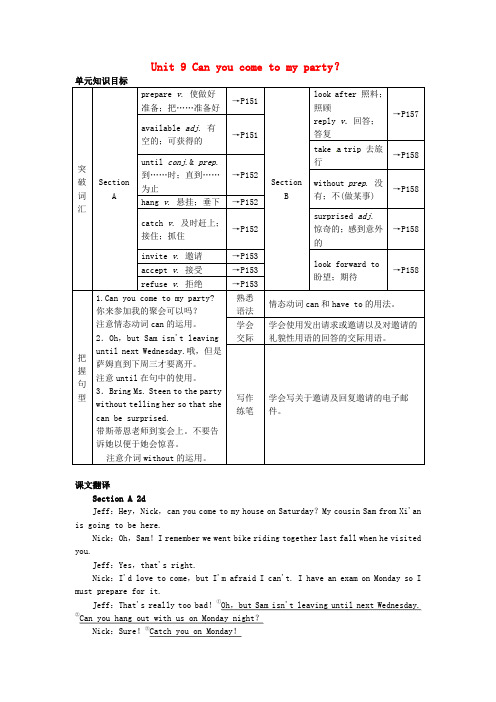
Unit 9 Can you come to my party?突破词汇SectionAprepare v. 使做好准备;把……准备好→P151SectionBlook after 照料;照顾reply v.回答;答复→P157 available adj. 有空的;可获得的→P151take a trip 去旅行→P158 until conj.& prep.到……时;直到……为止→P152without prep. 没有;不(做某事)→P158hang v. 悬挂;垂下→P152catch v. 及时赶上;接住;抓住→P152surprised adj.惊奇的;感到意外的→P158invite v. 邀请→P153look forward to盼望;期待→P158 accept v. 接受→P153refuse v. 拒绝→P153把握句型1.Can you come to my party?你来参加我的聚会可以吗?注意情态动词can的运用。
2.Oh,but Sam isn't leavinguntil next Wednesday.哦,但是萨姆直到下周三才要离开。
注意until在句中的使用。
3.Bring Ms. Steen to the partywithout telling her so that shecan be surprised.带斯蒂恩老师到宴会上。
不要告诉她以便于她会惊喜。
注意介词without的运用。
熟悉语法情态动词can和have to的用法。
学会交际学会使用发出请求或邀请以及对邀请的礼貌性用语的回答的交际用语。
写作练笔学会写关于邀请及回复邀请的电子邮件。
课文翻译Section A 2dJeff:Hey,Nick,can you come to my house on Saturday?My cousin Sam from Xi'an is going to be here.Nick:Oh,Sam!I remember we went bike riding together last fall when he visited you.Jeff:Yes,that's right.Nick:I'd love to come,but I'm afraid I can't. I have an exam on Monday so I must prepare for it.Jeff:That's really too bad!①Oh,but Sam isn't leaving until next Wednesday.②Can you hang out with us on Monday night?Nick:Sure!③Catch you on Monday!杰夫:嘿,尼克,星期六你能来我家吗?我来自西安的表弟萨姆打算到这儿。
人教版八年级上册英语 Unit 9 SectionB (2a-2e)
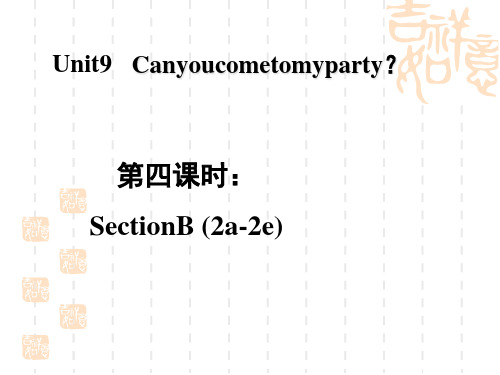
2c
Readthemessagesagainandanswerthequestions.
1.WIhta'tskainsduorfparritsyeispiat?r_t_y_._____________________ _____/_A_s_u__r_p_r_i_s_e_p_a_r_t_y_.______________________
知识点 考向一so【th重at在点此】引导目的状语从句,从句中
通常用may(might)或can(could)等情态动词。 eg:WelearnEnglishsothatwemayget moreknowledge. 我们学英语为的是获得更多的知识。
IhiredaboatsothatIcouldgofishing. 我租了一条船,为的是可以去钓鱼。
Icanhelptobuysomeofthefoodanddrinks.
IcanalsohelptobringMs.
Steentotheparty.
Ialreadyhaveagreatideaabouthowtodothat.
HeWei
3 HiDavid,
Thankssomuchforplanningthis.
2b
Readthemessagesquickly. Whydidthepeople writethem? Matchthereasonwitheachmessage.
1.acceptaninvitation2.makeaninvitation 3.turndownaninvitation
Message New Reply❷ForwardDelete Print Moveto
考向二 ShespokesoquietlythatIcoul
人教版八年级上册 第九单元知识点全八上-unit 9知识点

Unit9 Can you come to my party的知识点Grammar:1.情态动词can的用法小结:(1)表示能力,意为“能,会〞,其过去式为could。
(2)表示“请求许可〞。
在这一用法中,can与could都表示现在,但could比can语气更加委婉。
一般用在疑问句中,句型为Can you…?肯定答复为:Yes/Sure/Certainly,I'd love to。
否认答复常为:I'm sorry/Sorry,I can't。
(3)表示可能性,常用于否认句中。
eg:This can't be true.这不可能是真的。
2.【辨析】have to与musthave to表示客观需要,有人称、数和时态的变化;其否认形式为don't have to“不必〞。
must表示说话人的主观看法,认为有必要或义务去做某事,没有时态和人称的变化;其否认形式为mustn't“禁止〞。
3.情态动词can表示邀请Can you …?意为“你能…吗?〞。
此句型表示客气邀请某人做某事,can可以用could替换。
区别在与:用could比用can语气委婉,显得更有礼貌。
【拓展】向别人发出邀请、请求、建议或征求某人的意见,还有几种表达方式,大多数语气比较委婉,显得客气而有礼貌。
1)Would you like…?“你想要/愿意…吗?〞其后可以接名词、代词或动词不定式,用来提出建议或发出邀请。
eg: Would you like some oranges?2)Will/Would/Could you please…?“请你…好吗?〞其后接名词,用来提出建议或发出邀请。
eg: Will/Would/Could you please help me sweep the floor?3)Shall we…?“我们…好吗?〞shall是情态动词,其后接动词原形。
用于征求别人的意见。
Unit 9 Section B(2a-2e)八年级英语上册(人教版)

6. What kind of drinks would you like to serve? _A_l_l_k_in__d_s_o_f_o_r_a_n_g_e__ju_i_c_e_, _b_e_e_r_a_n_d__so__o_n_.__
7. Who will come to the party? __A_l_l_o_f_m__y_c_l_a_s_sm__a_t_e_s._______
2e Imagine one of your favorite teachers is leaving. Plan a party for him / her. Answer the questions with a partner.
1.Why is he /she one of your favorite teachers _S_h_e__o_f_te_n__e_n_c_o_u_r_a_g_e_m__e_a_n_d__h_e_lp__m__e_in__m_ y life.
8. What activities will there be at the party? __g_u_e_ss__ri_d_d_l_e_, _te_l_l_j_o_k_e_s,_s_i_n_g_a_n_d__s_o_o_n.
1. I’d love to, but I’m not available 2. is taking a trip to Wuhan … visit my aunt and uncle 3. be glad to help out with any of the party preparations
人教版八年级上册英语Unit9知识点梳理及语法讲义(教师版)
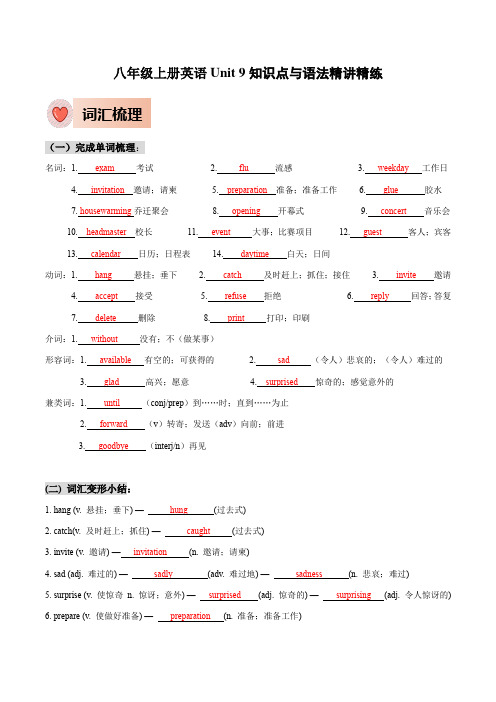
八年级上册英语Unit 9知识点与语法精讲精练词汇梳理(一)完成单词梳理:名词:1. exam考试 2. flu 流感 3. weekday 工作日4. invitation 邀请;请柬5. preparation 准备;准备工作6. glue 胶水7. housewarming乔迁聚会8. opening 开幕式9. concert 音乐会10. headmaster 校长11. event 大事;比赛项目12. guest 客人;宾客13. calendar 日历;日程表14. daytime 白天;日间动词:1. hang 悬挂;垂下 2. catch 及时赶上;抓住;接住 3. invite 邀请4. accept 接受5. refuse 拒绝6. reply 回答;答复7. delete 删除8. print 打印;印刷介词:1. without 没有;不(做某事)形容词:1. available 有空的;可获得的 2. sad (令人)悲哀的;(令人)难过的3. glad 高兴;愿意4. surprised 惊奇的;感觉意外的兼类词:1. until (conj/prep)到……时;直到……为止2. forward (v)转寄;发送(adv)向前;前进3. goodbye (interj/n)再见(二) 词汇变形小结:1. hang (v. 悬挂;垂下) — hung (过去式)2. catch(v. 及时赶上;抓住) — caught (过去式)3. invite (v. 邀请) — invitation (n. 邀请;请柬)4. sad (adj. 难过的) — sadly (adv. 难过地) — sadness (n. 悲哀;难过)5. surprise (v. 使惊奇n. 惊讶;意外) — surprised (adj. 惊奇的) — surprising (adj. 令人惊讶的)6. prepare (v. 使做好准备) — preparation (n. 准备;准备工作)7. open (v. 打开) — opening (n. 开幕式)【练一练】用所给词的适当形式填空1.Thanks a lot for your __invitation___ (invite), but I have to stay at home to do my homework.2.I would like to invite you to the ___opening____ (open) of our new store.3.Susan felt really ___surprised____ (surprise) at the surprising news.4.All the students are busy making ___preparation___(prepare) for the school music concert.5.He ___caught_____(catch) me by the arm and said, “Don't forget.”6.He often goes to school without ____having_____ (have) breakfast.7.They are going to have two ____concerts____ (concert) at this time of year.8.I ___hung______(hang) out late with my friends last night.9.My mother enjoys ___walking_____ (walk) after dinner to keep fit.10.Thanks for ____inviting_____ (invite) me to your party.(三) 短语攻关:prepare for 为……做准备go to the/a doctor 去看医生another time 其他时间;别的时间hang out 闲逛the day before yesterday前天the day after tomorrow 后天look after=take care of照料;照顾turn down 拒绝take a trip 去旅行help out (帮助……)解决look forward to 盼望;期待hear from 接到…(某人的)信in the end 最后have the flu 患流感so that 以便;为了the opening of ……的开幕式invite sb to do sth 邀请某人做某事refuse to do sth 拒绝做某事知识点梳理1.I’d love to e, but I’m afraid I can’t. 我想来,但是恐怕来不了。
人教版八上Unit9 SectionB词汇精讲

06
Unit 6 Section A , Section B
Unit 7
07 Section A , Section B
Unit 8
08 Section A , Section B
09 010
Unit 9 Section A , Section B
UniDt e9sCtinayn制y作ou come to my party? 单词表 (P69) invitation /,ɪnvɪ'teɪʃn/ n.
邀请;请柬
turn down 拒绝
相当于refuse.
1.她总是拒绝朋友的帮助.
She always _t_u_rn__d_o__w_n__ her friends’ help.
Unit 9 Can you come to my Destiny制作
party?
单词表 (P68) the day before yesterday 前天
look after 照顾
相当பைடு நூலகம்take care of….
他足够大了,能照顾自己了.
the day after tomorrow 后天 weekday /'wi:kdeɪ/ n. 工作日 look after 照顾
Destiny制作 Unit 9 Can you come to my
weekday cn.工作日
party?
指从星期一到星期五的任何一天.
单词表 (P68)
the day before yesterday 前天 在工作日 on weekdays
the day after tomorrow 后天 1.我们周一到周五必须去学校.
八年级上册英语第九单元2b知识点
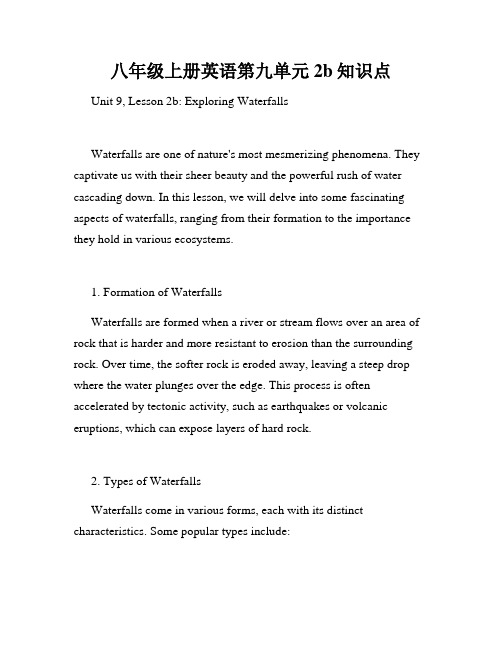
八年级上册英语第九单元2b知识点Unit 9, Lesson 2b: Exploring WaterfallsWaterfalls are one of nature's most mesmerizing phenomena. They captivate us with their sheer beauty and the powerful rush of water cascading down. In this lesson, we will delve into some fascinating aspects of waterfalls, ranging from their formation to the importance they hold in various ecosystems.1. Formation of WaterfallsWaterfalls are formed when a river or stream flows over an area of rock that is harder and more resistant to erosion than the surrounding rock. Over time, the softer rock is eroded away, leaving a steep drop where the water plunges over the edge. This process is often accelerated by tectonic activity, such as earthquakes or volcanic eruptions, which can expose layers of hard rock.2. Types of WaterfallsWaterfalls come in various forms, each with its distinct characteristics. Some popular types include:- Plunge Waterfalls: These are the classic waterfall types, characterized by a straight vertical drop, often creating a dramatic cascade.- Tiered Waterfalls: These waterfalls consist of a series of individual drops, forming multiple "steps" as the water descends.- Horsetail Waterfalls: In this type, the water maintains contact with the rock face throughout its descent, resembling the flow of a horse's tail.- Cascade Waterfalls: These waterfalls feature a series of small drops and rapids, creating a cascading effect.3. Famous Waterfalls Around the WorldWaterfalls are scattered throughout the globe, each with its unique allure. Let's take a quick tour of a few world-famous waterfalls:- Niagara Falls: Located on the border of the United States and Canada, Niagara Falls is arguably the most famous waterfall. Its mesmerizing beauty and immense volume of water attract millions of visitors each year.- Angel Falls: Found in Venezuela, Angel Falls is the highest uninterrupted waterfall globally, plunging an astounding 979 meters.- Victoria Falls: Straddling the border between Zambia and Zimbabwe, Victoria Falls is one of the world's largest waterfalls. Its thunderous roar and massive curtain of falling water are a sight to behold.4. Importance of WaterfallsWaterfalls play a vital role in maintaining healthy ecosystems. They provide a source of clean, oxygenated water that supports a wide range of plant and animal species. Additionally, the cascading water creates aeration, enriching the water with vital nutrients. Many communities also rely on waterfalls for recreational activities and tourism, which contribute to the local economy.5. Conservation EffortsDespite their beauty and significance, waterfalls face numerous threats, primarily due to human activities. Deforestation, pollution, and climate change pose significant risks to these natural wonders. It iscrucial to raise awareness and promote sustainable practices to protect and conserve waterfalls for future generations.Conclusion:Waterfalls are enchanting natural phenomena that captivate us with their awe-inspiring beauty and power. By understanding the formation and types of waterfalls, appreciating famous examples worldwide, acknowledging their importance in ecosystems, and recognizing the need for conservation efforts, we can ensure the preservation of these majestic wonders for years to come. Let us cherish and respect these remarkable features of nature as we continue to explore and learn from them.。
八年级上册英语第九单元2b课文知识点
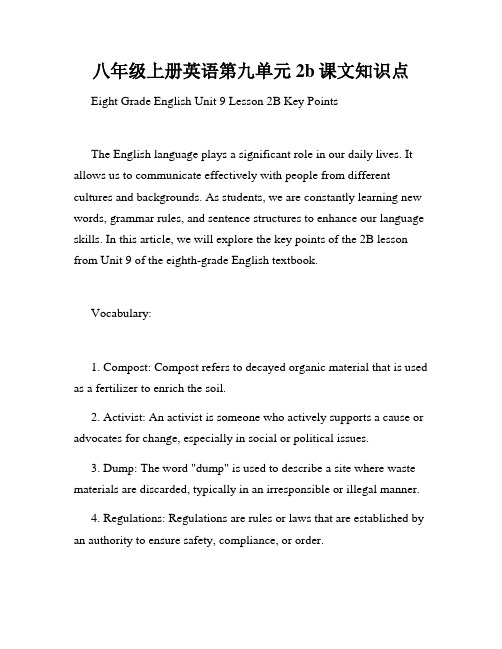
八年级上册英语第九单元2b课文知识点Eight Grade English Unit 9 Lesson 2B Key PointsThe English language plays a significant role in our daily lives. It allows us to communicate effectively with people from different cultures and backgrounds. As students, we are constantly learning new words, grammar rules, and sentence structures to enhance our language skills. In this article, we will explore the key points of the 2B lesson from Unit 9 of the eighth-grade English textbook.Vocabulary:1. Compost: Compost refers to decayed organic material that is used as a fertilizer to enrich the soil.2. Activist: An activist is someone who actively supports a cause or advocates for change, especially in social or political issues.3. Dump: The word "dump" is used to describe a site where waste materials are discarded, typically in an irresponsible or illegal manner.4. Regulations: Regulations are rules or laws that are established by an authority to ensure safety, compliance, or order.5. Reduce: To reduce means to make something smaller in size, quantity, or extent.Grammar:1. Past Continuous Tense: The past continuous tense is used to describe an ongoing action in the past. It is formed by using the past tense of the verb "to be" (was/were) followed by the present participle (-ing form) of the main verb. For example, "I was studying when the phone rang."2. Passive Voice: The passive voice is used when the focus is on the action rather than the subject performing the action. In passive sentences, the subject receives the action. For example, "The book was written by an unknown author."3. Modal Verb "Should": The modal verb "should" is used to indicate obligation, advisability, or expectation. It is often used to give advice or make suggestions. For example, "You should recycle your paper to save trees."Reading Comprehension:The 2B lesson revolves around the topic of environmental protection and the importance of recycling. It introduces us to Emma, an environmental activist who raises awareness about the importance of reducing waste and recycling. Emma believes that every individual should actively contribute to protecting the environment by following simple practices in their everyday lives.Emma highlights the harmful effects of waste accumulation in landfills, specifically focusing on plastic as a major contributor. She encourages her classmates to reduce, reuse, and recycle as effective ways to combat this issue. Emma's efforts are supported by recent regulations implemented in her city, which restrict the dumping of waste and enforce penalties for non-compliance.The lesson also introduces the concept of composting as a natural and sustainable method of recycling organic waste. Emma suggests that everyone can create their own compost at home by using kitchen scraps and yard waste. Composting not only reduces waste but also creates nutrient-rich soil for gardening.Through reading this lesson, we understand the vital role each individual plays in environmental sustainability. It instills in us the importance of taking responsibility for our actions and makingconscious choices to protect our planet. By actively participating in recycling programs, reducing waste, and advocating for change, we can contribute to a greener and more sustainable future.In conclusion, Unit 9 Lesson 2B of the eighth-grade English textbook sheds light on key points related to environmental protection and recycling. It emphasizes the significance of vocabulary, grammar concepts, and reading comprehension skills. By understanding and applying these knowledge points, we can develop a deeper understanding of how language learning intersects with real-world issues and contribute to a more sustainable future.。
八年级英语上册9单元2b知识点
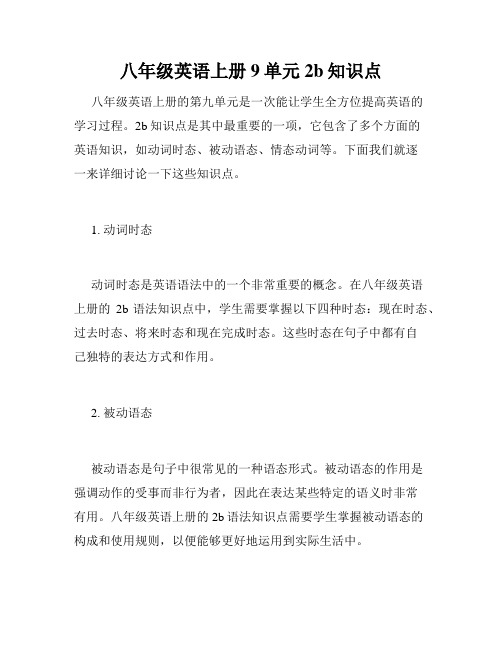
八年级英语上册9单元2b知识点八年级英语上册的第九单元是一次能让学生全方位提高英语的学习过程。
2b知识点是其中最重要的一项,它包含了多个方面的英语知识,如动词时态、被动语态、情态动词等。
下面我们就逐一来详细讨论一下这些知识点。
1. 动词时态动词时态是英语语法中的一个非常重要的概念。
在八年级英语上册的2b语法知识点中,学生需要掌握以下四种时态:现在时态、过去时态、将来时态和现在完成时态。
这些时态在句子中都有自己独特的表达方式和作用。
2. 被动语态被动语态是句子中很常见的一种语态形式。
被动语态的作用是强调动作的受事而非行为者,因此在表达某些特定的语义时非常有用。
八年级英语上册的2b语法知识点需要学生掌握被动语态的构成和使用规则,以便能够更好地运用到实际生活中。
3. 情态动词情态动词是英语中一类非常重要的词汇,它们可以对动词的意义进行修饰和强化。
在八年级英语上册的2b语法知识点中,学生需要了解情态动词的种类、用法和特点,如can、may、must等。
4. 非谓语动词非谓语动词是英语语法中的一类词汇形式,它不具有时态和数的变化,不作谓语动词,但可以作主语、宾语、表语或定语等。
在八年级英语上册的2b语法知识点中,学生需要掌握非谓语动词的种类和用法,如动词不定式、动名词和现在分词。
5. 宾语从句宾语从句是表示宾语的一种从句形式。
在句子中,宾语从句通常由一个连词引导,并且在句中扮演宾语的角色。
八年级英语上册的2b语法知识点需要学生掌握宾语从句的种类、用法和构成规则,如疑问词引导的宾语从句、宾语从句中的时态和语序等。
以上就是八年级英语上册9单元2b知识点的全部内容。
学生在学习这些知识点时,不仅需要掌握它们的基本概念和用法,更要通过大量的实例训练,才能更加深入地理解它们的意义和作用。
希望每一位学生都能够认真学习这些知识点,提高自己的英语实力。
八年级上英语第九单元2b知识点
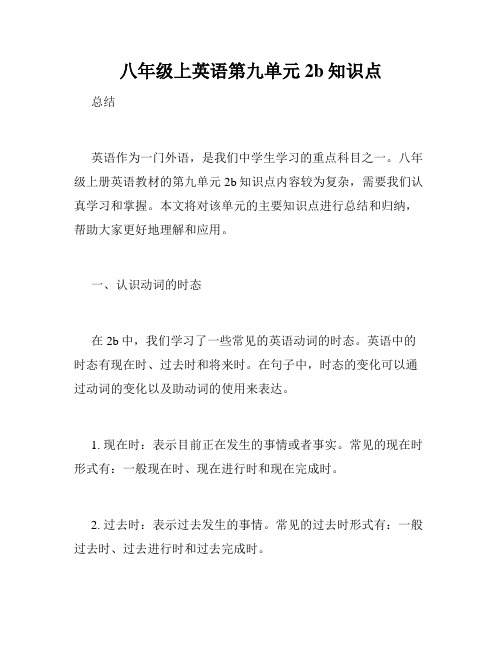
八年级上英语第九单元2b知识点总结英语作为一门外语,是我们中学生学习的重点科目之一。
八年级上册英语教材的第九单元2b知识点内容较为复杂,需要我们认真学习和掌握。
本文将对该单元的主要知识点进行总结和归纳,帮助大家更好地理解和应用。
一、认识动词的时态在2b中,我们学习了一些常见的英语动词的时态。
英语中的时态有现在时、过去时和将来时。
在句子中,时态的变化可以通过动词的变化以及助动词的使用来表达。
1. 现在时:表示目前正在发生的事情或者事实。
常见的现在时形式有:一般现在时、现在进行时和现在完成时。
2. 过去时:表示过去发生的事情。
常见的过去时形式有:一般过去时、过去进行时和过去完成时。
3. 将来时:表示将来要发生的事情。
常见的将来时形式有:一般将来时、将来进行时和将来完成时。
二、熟悉常用的连接词在英语中,连接词的使用对于整合句子结构和表达句意起到至关重要的作用。
2b中,我们学习了一些常见的连接词,它们帮助我们将两个或多个句子连接在一起,使其成为一个完整的语句。
1. 并列连接词:表示并列关系的连接词,如and、but、or等。
2. 时间连接词:表示时间关系的连接词,如when、after、before等。
3. 原因连接词:表示原因关系的连接词,如because、since等。
4. 结果连接词:表示结果关系的连接词,如so、therefore等。
通过学习并掌握这些连接词,我们可以更加灵活地使用英语,表达自己的观点和想法。
三、学会使用直接引语和间接引语在英语中,当我们想要引用他人的话语时,可以使用直接引语或间接引语的形式。
这两种形式有不同的表达方式和语法结构。
1. 直接引语:使用原始的、具体的语句来引用他人的话语。
在引用时需要使用引号将其包裹起来。
例如:He said, "I am a student."2. 间接引语:使用自己的话语来转述他人的话语,不使用引号。
在间接引语中,一般需要改变时态和人称。
八年级上册英语第九单元B部分2b知识点
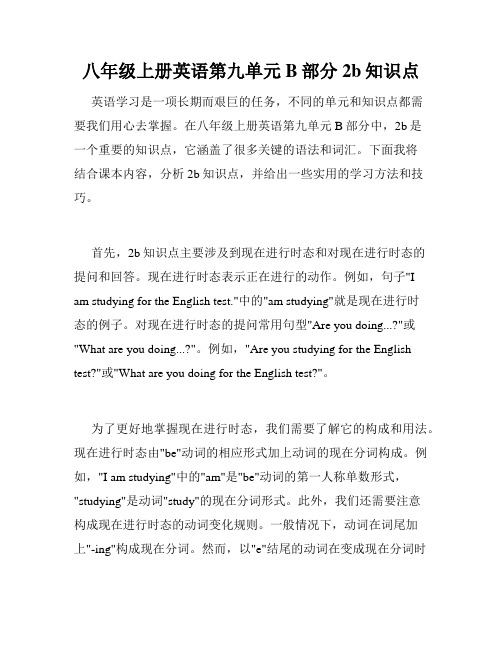
八年级上册英语第九单元B部分2b知识点英语学习是一项长期而艰巨的任务,不同的单元和知识点都需要我们用心去掌握。
在八年级上册英语第九单元B部分中,2b是一个重要的知识点,它涵盖了很多关键的语法和词汇。
下面我将结合课本内容,分析2b知识点,并给出一些实用的学习方法和技巧。
首先,2b知识点主要涉及到现在进行时态和对现在进行时态的提问和回答。
现在进行时态表示正在进行的动作。
例如,句子"I am studying for the English test."中的"am studying"就是现在进行时态的例子。
对现在进行时态的提问常用句型"Are you doing...?"或"What are you doing...?"。
例如,"Are you studying for the English test?"或"What are you doing for the English test?"。
为了更好地掌握现在进行时态,我们需要了解它的构成和用法。
现在进行时态由"be"动词的相应形式加上动词的现在分词构成。
例如,"I am studying"中的"am"是"be"动词的第一人称单数形式,"studying"是动词"study"的现在分词形式。
此外,我们还需要注意构成现在进行时态的动词变化规则。
一般情况下,动词在词尾加上"-ing"构成现在分词。
然而,以"e"结尾的动词在变成现在分词时需要将"e"去掉并加上"-ing"。
例如,"make"变成"making","write"变成"writing"。
八年级上册英语九单元2b知识点
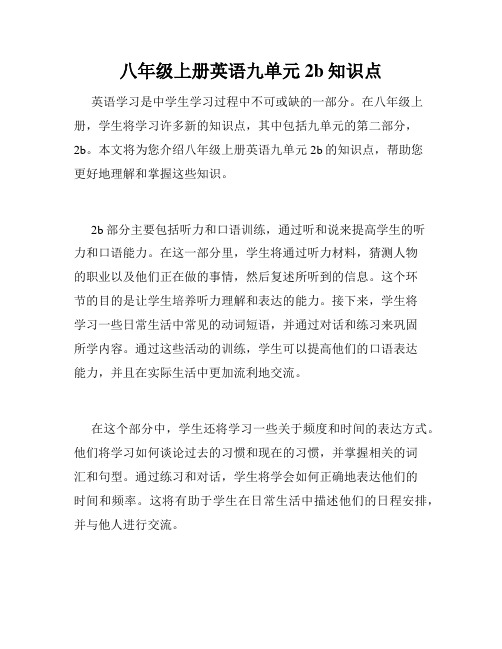
八年级上册英语九单元2b知识点英语学习是中学生学习过程中不可或缺的一部分。
在八年级上册,学生将学习许多新的知识点,其中包括九单元的第二部分,2b。
本文将为您介绍八年级上册英语九单元2b的知识点,帮助您更好地理解和掌握这些知识。
2b部分主要包括听力和口语训练,通过听和说来提高学生的听力和口语能力。
在这一部分里,学生将通过听力材料,猜测人物的职业以及他们正在做的事情,然后复述所听到的信息。
这个环节的目的是让学生培养听力理解和表达的能力。
接下来,学生将学习一些日常生活中常见的动词短语,并通过对话和练习来巩固所学内容。
通过这些活动的训练,学生可以提高他们的口语表达能力,并且在实际生活中更加流利地交流。
在这个部分中,学生还将学习一些关于频度和时间的表达方式。
他们将学习如何谈论过去的习惯和现在的习惯,并掌握相关的词汇和句型。
通过练习和对话,学生将学会如何正确地表达他们的时间和频率。
这将有助于学生在日常生活中描述他们的日程安排,并与他人进行交流。
此外,在这个部分里,学生还将学习如何使用比较级和最高级来描述人和物。
通过对比不同的人或物的特点和性格,学生可以扩展他们的词汇量,并培养他们对英语的理解和灵活运用。
通过练习和实践,学生将学会如何使用这些语法结构来描述人和物的不同特点,从而提高他们对英语的运用能力。
在学习这些知识点过程中,学生可以通过课堂活动和小组讨论来增强他们的互动和参与。
通过与同学的互动,学生可以更好地理解和运用所学的知识,并且可以通过与他人的合作来提高他们的口语和听力能力。
同时,通过与他人的交流,学生还可以学习到不同文化的知识和观念,从而拓宽他们的视野。
通过学习八年级上册英语九单元2b的知识点,学生将能够进一步提高他们的听力和口语能力,扩展他们的词汇量,提高他们对语法的理解和运用。
同时,学生还可以通过与他人的互动和交流来拓宽他们的视野,学习到更多的文化知识。
这些都是学生英语学习过程中不可或缺的一部分,也是学生综合素质的重要组成部分。
八年级上册英语第九单元B部分知识点
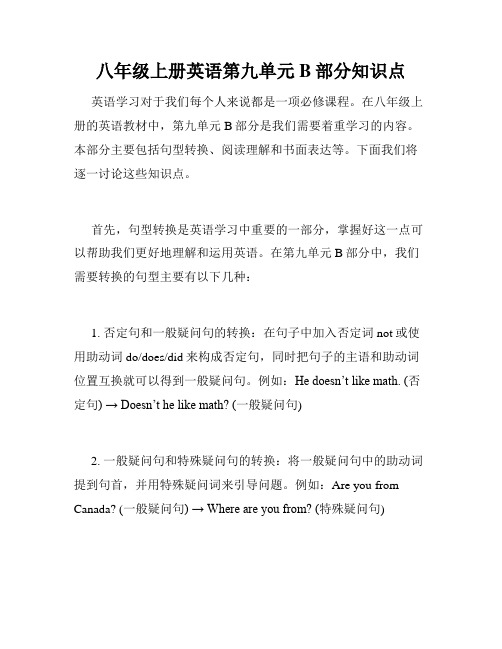
八年级上册英语第九单元B部分知识点英语学习对于我们每个人来说都是一项必修课程。
在八年级上册的英语教材中,第九单元B部分是我们需要着重学习的内容。
本部分主要包括句型转换、阅读理解和书面表达等。
下面我们将逐一讨论这些知识点。
首先,句型转换是英语学习中重要的一部分,掌握好这一点可以帮助我们更好地理解和运用英语。
在第九单元B部分中,我们需要转换的句型主要有以下几种:1. 否定句和一般疑问句的转换:在句子中加入否定词not或使用助动词do/does/did来构成否定句,同时把句子的主语和助动词位置互换就可以得到一般疑问句。
例如:He doesn’t like math. (否定句) → Doesn’t he like math? (一般疑问句)2. 一般疑问句和特殊疑问句的转换:将一般疑问句中的助动词提到句首,并用特殊疑问词来引导问题。
例如:Are you from Canada? (一般疑问句) → Where are you from? (特殊疑问句)3. 直接引语和间接引语的转换:在引导词后加一个连词that,并把句子中的人称代词、时态、人称进行相应的改变。
例如:He said, "I am happy." (直接引语) → He said that he was happy. (间接引语)接下来,阅读理解是英语学习中提高阅读能力的重要练习。
在第九单元B部分,我们需要通过阅读理解来获取相关信息并回答问题。
阅读理解题目的形式有多样,在答题过程中我们需要注意以下几点:1. 仔细阅读题目:在阅读理解之前,我们应该先阅读问题,这样我们在阅读文章时就会有目的性地寻找答案。
2. 查找关键词:有时候问题中的关键词会出现在文章中,我们可以根据这些关键词来定位答案,提高答题的准确性。
3. 注意上下文的联系:在阅读理解的过程中,我们需要注意上下文的联系,通过了解前后句的逻辑关系来推断答案。
最后,书面表达是英语学习中培养语言表达能力的重要环节。
Unit9SectionB2a_2e课件人教版英语八年级上册(5)
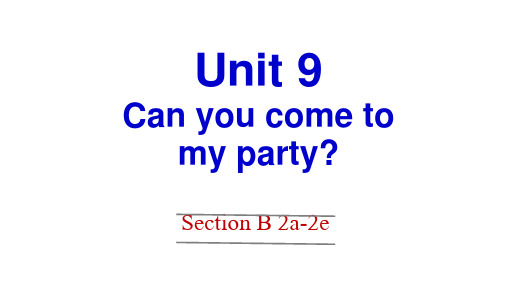
11. What a great idea! “多好的主意啊!” 拓展:感叹句的构成:
How happy they look!他们看起来多高兴啊! How well she sings! 她唱得多好呀! How I miss you! 我多么想你啊! What a beautiful girl she is!她是个多么漂亮的女孩啊!
14. Thanks for doing sth. “感谢某人做某事” Thanks for helping me.感谢你帮助我。
Thanks for + 名词“因……而感谢某人”
15. so much “如此多”①后接不可数名词; ②也可以放在动词后,修饰动词)
There was so much noise outside.外面嘈杂声很多。 Thank you so much.非常感谢你。
Dear classmates, As I’m sure you know by now, our favorite teacher, Ms. Steen, is leaving soon to go back to the US. We’re very sad that she’s leaving because she is a fun teacher. To show how much we’re going to miss her, let’s have a surprise party for her next Friday the 28th! Can you come to the party? If so, can you help with any of these things? Please tell me by this Friday.
英语教材解读人教八年级上册Unit9_SectionB
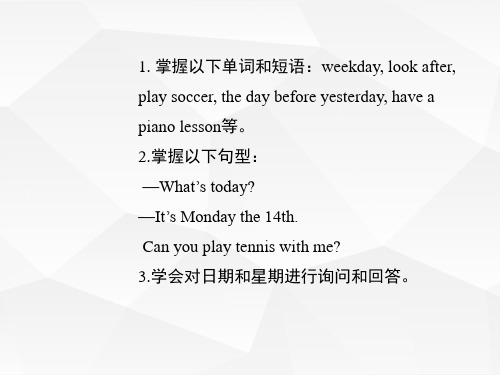
Days a. today b. tomorrow c. the day after tomorrow
Pair work
1f Students A is Andy and Student B is Vince. Andy, invite Vince to play tennis.
A: Hi, Vince. Can you play tennis with me? B: When? A: Today? B: Sorry, I can’t. I …
1. 掌握以下单词和短语:weekday, look after, play soccer, the day before yesterday, have a piano lesson等。 2.掌握以下句型: —What’s today? —It’s Monday the 14th. Can you play tennis with me? 3.学会对日期和星期进行询问和回答。
today tomorrow yesterday the day before yesterday the day after tomorrow weekday weekend
Sunday Monday Tuesday Wednesday the_2_6_t_h__ theቤተ መጻሕፍቲ ባይዱ2_7_t_h__ the_2_8_t_h__ the_2_9_t_h__
the_2_6_t_h__ the _2_7_t_h__ the_2_8_t_h__ the_2_9_t_h__
Thursday Friday Saturday
the_3_0_t_h_ the_1_s_t___ the_2_n_d___
1b Write the words below the correct dates on the calendar.
八年级英语9单元2b知识点
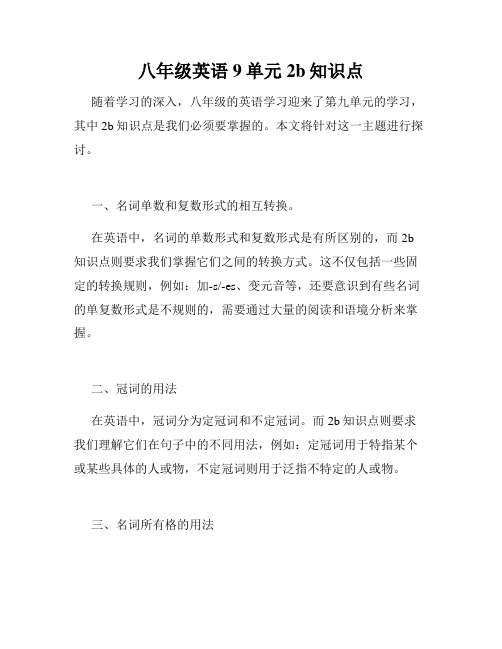
八年级英语9单元2b知识点随着学习的深入,八年级的英语学习迎来了第九单元的学习,其中2b知识点是我们必须要掌握的。
本文将针对这一主题进行探讨。
一、名词单数和复数形式的相互转换。
在英语中,名词的单数形式和复数形式是有所区别的,而2b 知识点则要求我们掌握它们之间的转换方式。
这不仅包括一些固定的转换规则,例如:加-s/-es、变元音等,还要意识到有些名词的单复数形式是不规则的,需要通过大量的阅读和语境分析来掌握。
二、冠词的用法
在英语中,冠词分为定冠词和不定冠词。
而2b知识点则要求我们理解它们在句子中的不同用法,例如:定冠词用于特指某个或某些具体的人或物,不定冠词则用于泛指不特定的人或物。
三、名词所有格的用法
名词所有格主要用于表示某物属于谁,例如:这是John的书(This is John's book)。
2b知识点要求我们掌握名词所有格的基本用法,并能够熟练地运用到日常生活和学习中。
四、形容词的用法和比较级
形容词用于修饰名词,而在英语中,形容词有比较级和最高级之分。
2b知识点要求我们掌握形容词的基本用法,并且能够熟练地运用到句子中,同时还要能够理解比较级和最高级的用法,如何正确地比较两个或多个人或物的差异。
五、介词的用法
介词是用来连接名词或代词和其他词的一种词类,常出现在句子中。
而2b知识点要求我们学会基本的介词用法,并能够理解它们在句子中的作用。
总之,2b知识点是八年级英语学习中的重要内容,我们要通过学习和实践来掌握这些知识点。
只有深入学习,多加练习,才能使英语水平得到提高。
人教版英语八年级上册Unit9 SectionB 教材知识详解

Unit9 SectionB 教材知识详解教材英汉对译Section B 2b1.accept an invitation 2.make an invitation3.turn down an invitation,Hi David,What a great idea!I really like Ms.Steen a lot.She helped me to improve my English so much.I'm sad to see her go,and this party is th e best way to say “Thank you and goodbye.” I can help to buy some of the food and drinks.I can also help to bring Ms.Steen to the party.I already have a great idea about how to do that.He WeiHi David,Thanks so much for planning this.I'd love to come to the party,but I'm not available.①My family is taking a trip to Wuhan at the end of this month to visit my aunt and uncle.However,I'd still be glad to help out with any of the party preparations,like planning the games.Let me know if you need my help.JakeDear classmates,As I'm sure you know by now,our favorite teacher,Ms.Steen,is leaving soon to go back to the US.We're very sad that she's leaving because she is a fun teacher.To show how much we're going to miss her,let's have a surprise party for her next Friday the 28th!Can you come to the party?If so,can you help with any of these things?Please tell me by this Friday.1) Buy food and drinks.2) Think of games to play.3) Prepare things we need for the games(glue,paper,pens,...).4)②Bring Ms.Steen to the party without telling her so that she can be surprised.③I look forward to hearing from you all.David3aDear Parents,I would like to invite you to the opening of our new library at No.9 High School.The opening will be on the morning of Wednesday,January 8th at 9:00.After this,you can enjoy our school concert.Then lunch will be in the school hall at 12:00. I would also like to invite each parent to bring one book as a gift for the new library.④Please reply in writing to this invitation by Friday,December 20th.Larry SmithHeadmaster,1.接受邀请 2.发出邀请 3.拒绝邀请大卫,你好!多么好的一个主意呀!我真的非常喜欢斯蒂恩老师。
Unit9重要知识点讲解人教版八年级英语上册
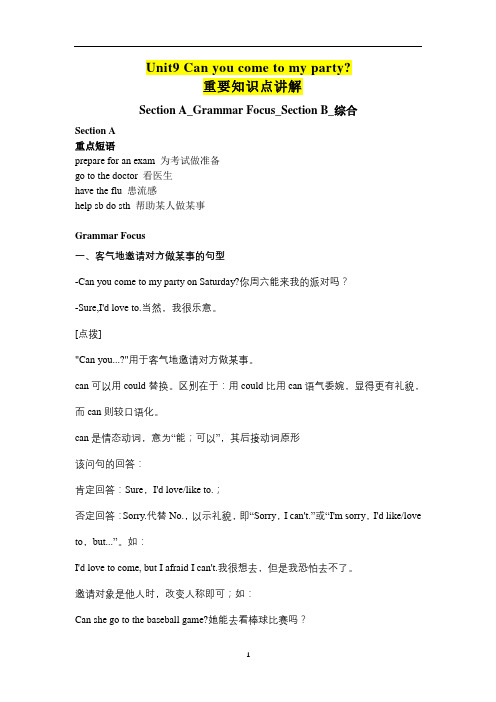
Unit9 Can you come to my party?重要知识点讲解Section A_Grammar Focus_Section B_综合Section A重点短语prepare for an exam 为考试做准备go to the doctor 看医生have the flu 患流感help sb do sth 帮助某人做某事Grammar Focus一、客气地邀请对方做某事的句型-Can you come to my party on Saturday?你周六能来我的派对吗?-Sure,I'd love to.当然,我很乐意。
[点拨]"Can you...?"用于客气地邀请对方做某事。
can可以用could替换。
区别在于:用could比用can语气委婉,显得更有礼貌,而can则较口语化。
can是情态动词,意为“能;可以”,其后接动词原形该问句的回答:肯定回答:Sure,I'd love/like to.;否定回答:Sorry.代替No.,以示礼貌,即“Sorry,I can't.”或“I'm sorry,I'd like/love to,but...”。
如:I'd love to come, but I afraid I can't.我很想去,但是我恐怕去不了。
邀请对象是他人时,改变人称即可;如:Can she go to the baseball game?她能去看棒球比赛吗?No,she's not available.She must go to the doctor.不,她没时间。
她要去看医生。
二、mightThey might have to meet their friends.他们可能要见他们的朋友。
[点拨]"might"意为"可能",语气不强,表达的可能性稍小于can。
- 1、下载文档前请自行甄别文档内容的完整性,平台不提供额外的编辑、内容补充、找答案等附加服务。
- 2、"仅部分预览"的文档,不可在线预览部分如存在完整性等问题,可反馈申请退款(可完整预览的文档不适用该条件!)。
- 3、如文档侵犯您的权益,请联系客服反馈,我们会尽快为您处理(人工客服工作时间:9:00-18:30)。
Fill in the blanks with the right words. Ms. Steen is a fun teacher. She’s going back to the US soon. So, all the students are very ____. sad To show how much they’re going to ____ miss her, David wants to have a _______ surprise ____ party for her next Friday the 28th. He needs prepare the some students to help him ________ party.
2. reply v. 回答;答复 They replied to my letter three days ago. 三天前他们回复了我的信。 3. print v. 打印;印刷
Can you print this for me?
你能给我印出这个来吗?
4. delete v. 删除 Please delete my names from your list. 请把我的名字从你的清单中 删除。 5. turn down (=refuse) 拒绝
Words preview
invitation n. 邀请;请柬 turn down 拒绝 reply v. 回答;答复 forward v. 转寄;发送 adv. 向前;前进 delete v. 删除 print v. 打印;印刷 sad adj. (令人)悲哀的; (令人)难过的
Words preview
7. sad adj. (令人)悲哀的; (令人)难过的 She was very sad when her cat died.
她的猫死后,她很悲伤。 8. glad adj. 高兴;愿意 I am glad that you can come. 你能来我很高兴。
9. goodbye interj. & n. 再见 She said goodbye to me and walked away. 她说了再见就走了。
1. invitation n. 邀请;请柬 preparation n. 准备;准备工作
动词+tion (后缀)→invitation 动词+tion (后缀)→ preparation She didn’t accept my invitation. 她没有接受我的邀请。 He didn’t do any preparation for this exam, so he failed. 他考试前没做任何准备,所以不及格。
look forward to + V–ingyou again. 我们盼望再次见到你。
15. hear from 接到(某人的信,电话等) I hear from my cousin every two months. 我每两个月就会收到我表哥的来信。
2. look forward to 是一个固定的结构, 表示“期待;期盼”,其中to是介词, 因此后面的动词要用其-ing形式。 I look forward to your reply. 我期待你的答复。 I’m really looking forward to seeing my teacher again. 我很期待再次见到我的老师。
根据箭头指向的汉语说出英语短语。
make an invitation accept an invitation turn down an invitation be free/available have a surprise party look forward to doing hear from sb. bring…to…
Why did she turn down your invitation? 她为什么谢绝你的邀请?
6. forward v. 转寄;发送 adv. 向前;前进 You can forward e-mail to someone else. 你可以将电子寄件转发给别人。 She stepped forward in order to see clearly. 她向前走了一步以便能看得更清楚。
a sun.
人生没有朋友,犹如生活中没有太阳。
13. surprised adj. 惊奇的;感觉意外的 动词surprise + ed → surprised 惊奇的
He was surprised to find
nobody was at home.
他很吃惊地发现没人在家。
14. look forward to 盼望;期待
goodbye interj.&n. 再见 take a trip 去旅行 glad adj. 高兴;愿意 preparation n. 准备;准备工作 glue n. 胶水 without prep. 没有;不(做 某事) surprised adj. 惊奇的;感觉 意外的
Words preview
look forward to hear from 盼望;期待 接到(某人的) 信、电话等 housewarming n. 乔迁聚会
1. so that 与 so…that辨析 ①so that 意为“以便于;以至于”,引 导目的状语从句,从句中常用can, could。 ②so … that意为“如此„„以至于”, 引导结果状语从句。 Tell me her address so that I can find her. 告诉我她的地址,以便于我找到她。 The box is so heavy that I can’t carry it. 这箱子太重了,我搬不动它。
10. take a trip
去旅行
I’d like to take a trip to England. 我想去英国旅行。
11. glue
n. 胶水
The glue doesn’t work well.
这胶水不粘了。
12. without prep. 没有;不(做某事)
A life without a friend is a life without
3. make it是一个独立的表述方式, 表示“及时到达”“成功;胜利”“约 定”。 If we run, we should make it. 要是我们跑的话,应该及时到达。 Though it was difficult, they still make it. 虽然艰难,但他们依然成功了。 Let’s make it at 8 O’clock at the school gate. 我们约定8点钟在学校门口。
